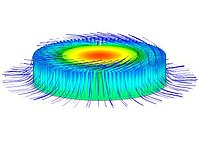
Photo from wikipedia
Molecular solar thermal (MOST) materials, which can efficiently capture solar energy and release it as heat on demand, are promising candidates for future personal thermal management (PTM) applications, preferably in… Click to show full abstract
Molecular solar thermal (MOST) materials, which can efficiently capture solar energy and release it as heat on demand, are promising candidates for future personal thermal management (PTM) applications, preferably in the form of fabrics. However, developing MOST fabrics with high energy‐storage capacity and stable working performance remains a significant challenge because of the low energy density of the molecular materials and their leakage from the fabric. Here, an efficient and robust MOST fabric for PTM using azopyrazole‐containing microcapsules with a deep‐UV‐filter shell is reported. The MOST fabric, which can co‐harvest solar and thermal energy, achieves efficient photocharging and photo‐discharging (>90% photoconversion), a high energy density of 2.5 kJ m−2, and long‐term storage sustainability at month scale. Moreover, it can undergo multiple cycles of washing, rubbing, and recharging without significant loss of energy‐storage capacity. This MOST microcapsule strategy is easily used for the scalable production of a MOST fabric for solar thermal moxibustion. This achievement offers a promising route for the application of wearable MOST materials with high energy‐storage performance and robustness in PTM.
Journal Title: Advanced Materials
Year Published: 2023
Link to full text (if available)
Share on Social Media: Sign Up to like & get
recommendations!